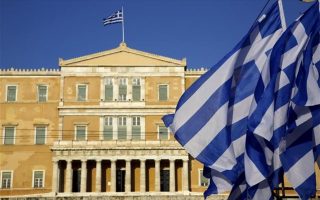Landmark moments

The question posed by Kathimerini can be answered in at least two ways: “Objectively,” by referring to the major events that have gone down in history as emblematic of the 50-year-period, such as the adoption of the Constitution, Greece’s accession to the EEC, PASOK’s promise for “change” in 1981 or the establishment of the National Health System; or “subjectively,” by emphasizing “moments” that had an impact on the respondent, regardless of historical developments.
So much has been written about the Metapolitefsi in recent months that I chose the second approach.
As a university professor, a practicing lawyer and a human rights activist, what do I keep from the Metapolitefsi?
Above all, I hold on to something that was not at all self-evident when I graduated from the Athens Law School in 1972: that I belong to the first generation of university professors who, since the establishment of the Greek state, were able to pursue a career without being persecuted for their beliefs. During the Metapolitefsi, if the teaching of constitutional law suffered from anything, it was not the lack of academic freedom, as in the past, but, rather, the “commitment” of many of us to one “cause” or another. This came at the expense of the quality of scientific dialogue. It is up to others to judge who among us was able to resist the temptation, and who failed.
Starting from this significant achievement, namely precious academic freedom, I retain:
First, the prosecution (September 2013) and conviction (October 2020) of the leadership of Golden Dawn for specific criminal acts and, above all, for directing a criminal organization. By blocking the attack squads of this Nazi organization, our democracy, thanks to some brave judges, showed that it had matured. This was something both Italy’s constitutional monarchy and the Weimar Republic had failed to do during the interwar period, tolerating the lawful rise to power of Benito Mussolini and Adolf Hitler.
The Kostas Simitis administration did not back down on a matter of principle and gave short shrift to the ambitions of the Church of Greece
Secondly, I retain the victory of a secular state in the identity card dispute (2000-2001). Facing an intelligent but ruthless archbishop who organized mass gatherings of hundreds of thousands of zealots in Thessaloniki and Athens, the Kostas Simitis administration did not back down on a matter of principle and gave short shrift to the ambitions of the Church of Greece, which was determined to turn the country into an Orthodox Christian Iran.
Thirdly, I would place the Prespa Agreement (June 2018), which ended a decades-old dispute, imposing reason over emotion. It was undoubtedly SYRIZA’s most significant achievement, as it freed our diplomacy from a gaping wound that prevented it from focusing on more essential issues (Greek-Turkish relations and more).
Finally, I would mention the positive outcome for Greece of the former royal family’s property dispute in the European Court of Human Rights (November 2002). By limiting to 13.5 million euros the astronomical compensation demanded by the former king for Tatoi, Mon Repos and Polydendri, the judges confirmed Alexandros Svolos’ 1927 admonition that incredible greed was characteristic of this dynasty.
As for the “moments” of the Metapolitefsi that, from the perspective of my work, I would like to “forget,” I name three:
First, the indecent removal of Konstantinos Karamanlis as president in March 1985 and the manipulation to elect Christos Sartzetakis a month later. I am not so concerned with the ethical side of the issue, about which much could be written, but with the ease with which the then government and many colleagues – prominent legal scholars, notably – were ready to brush off blatant violations of the law.
Secondly, I would highlight how the anti-systemic – but not only – Left undermined the achievements of the Metapolitefsi after 2010, with slogans like “Burn Parliament” and violence against political opponents. This was a practice tolerated, if not fostered, by SYRIZA, in its bid for power. Its culmination was the tragicomedy of the first half of 2015 and the referendum of July 5, which almost severed Greece from Europe. And the question remains: was the subsequent shift a tactical move or a genuine reorientation of the Greek Left towards more liberal, pro-European positions? Finally, as a “dark” moment in my personal journey, I consider our defeat in the Council of State in 2014 regarding citizenship or migrant children and their right to vote in local elections. This case vividly demonstrated that Greek liberalism retreats when confronted with deeper identity stereotypes. It remains to be seen whether the current government’s legalization of same-sex marriage will reverse the picture.
Nikos Alivizatos is a professor emeritus of constitutional law at the University of Athens.





